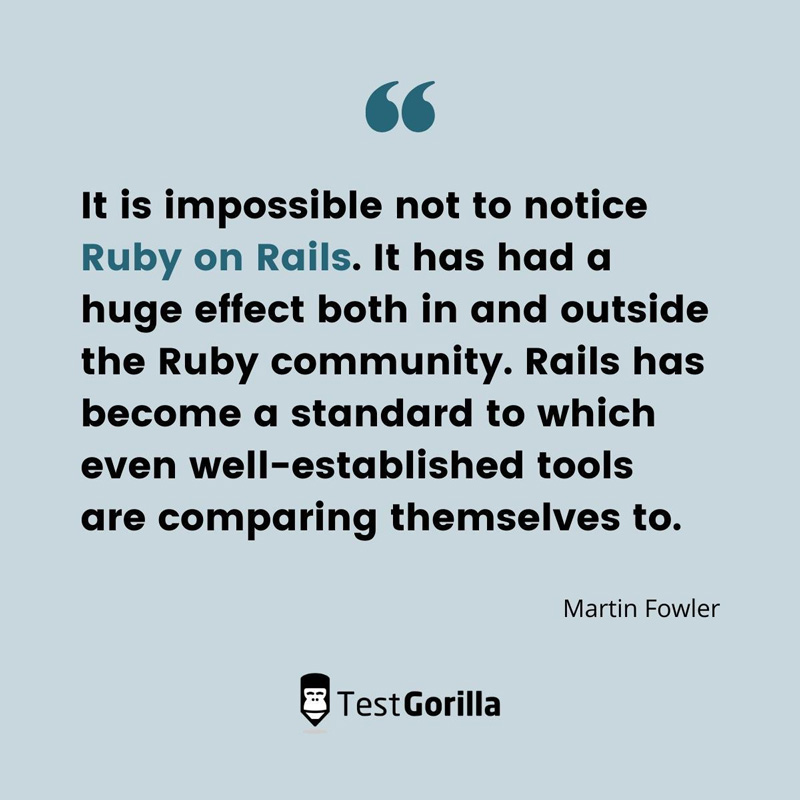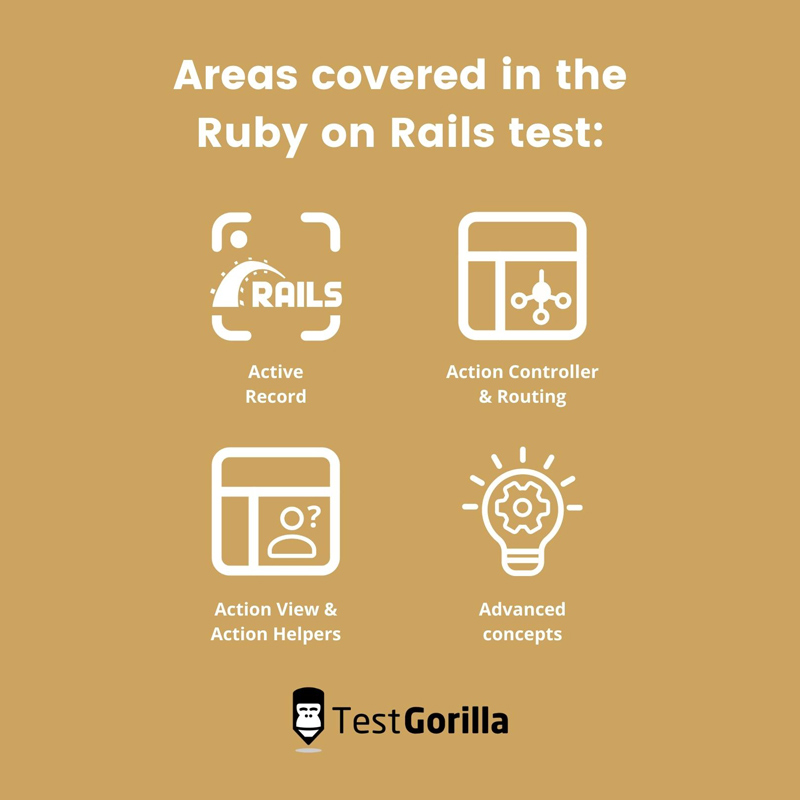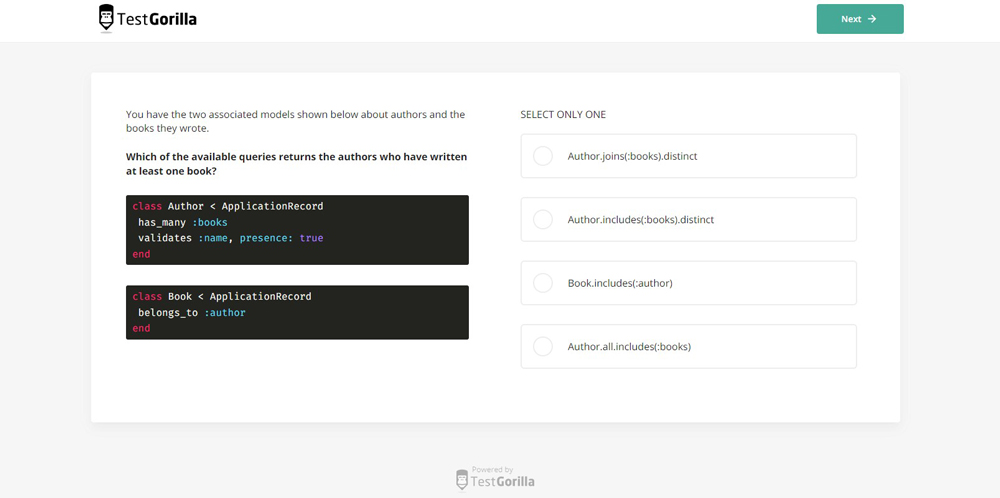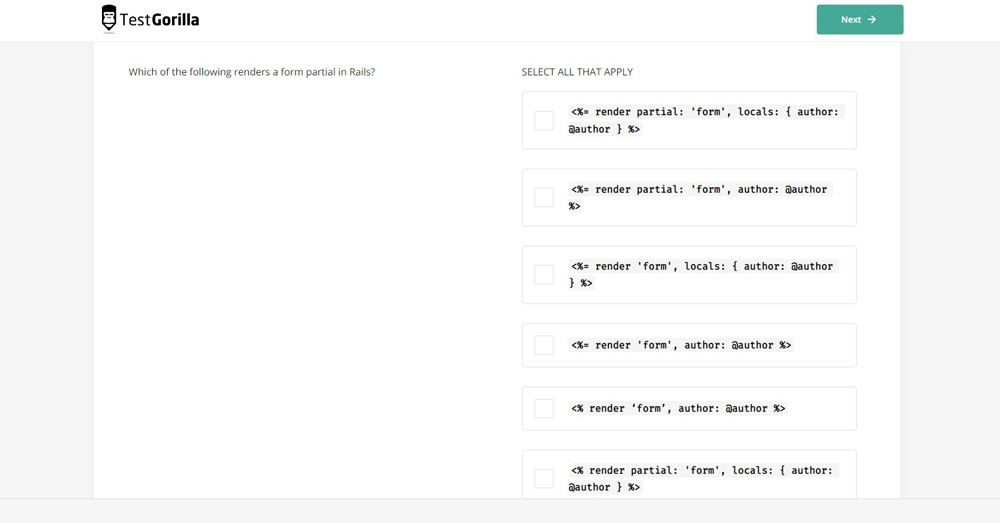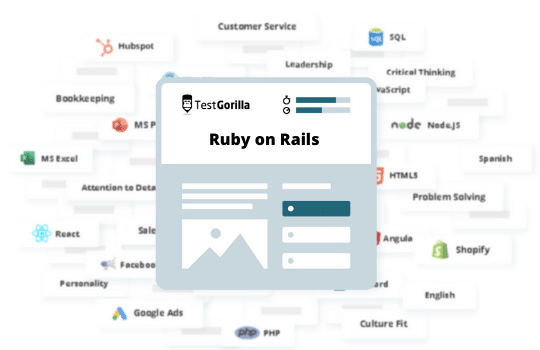Your guide to hiring a Ruby on Rails developer for your business
You need to hire a Ruby on Rails developer with all the right skills, but where do you start?
Unless you have in-depth knowledge of Ruby on Rails (also known as RoR and Ruby) and web development, it can be tricky to navigate your way through the hiring process successfully.
That’s why we’ve put together this handy guide to take you through hiring the best Ruby on Rails developer for your business, and to show you how to use our coding tests to improve your hiring process.
We’ll take a closer look at RoR developers and the crucial skills they should have, along with job responsibilities and salary expectations, so you have all the information you need to write your Ruby on Rails developer job description and accurately evaluate your applicants.
Then, we’ll walk you through how to test for those all-important Ruby on Rails programming skills, and how to put together a thorough pre-employment testing assessment that enables you to find the top-scoring candidates to take to the interview stage. Even better, all of this is possible without you having to look at a single resume.
Sounds good?
Let’s get to it and help you hire a Ruby on Rails developer. First, we’ll kick off with a quick look at RoR itself (we promise there’s no tech jargon), and then at the varied roles for developers.
Table of contents
- Why is Ruby on Rails so popular?
- Hire a Ruby on Rails developer: Job roles
- Ruby on Rails developer: Responsibilities
- Top Ruby on Rails skills for developers
- Ruby on Rails developers: Salaries
- Hire a Ruby on Rails developer with skills testing
- Create a pre-employment assessment around the Ruby on Rails test
- Take the next step to hire a Ruby on Rails developer with TestGorilla
Why is Ruby on Rails so popular?
Although Ruby is an old open-source programming language (mid 1990s vintage), it found its superpowers when it was combined with Rails, which is another programming language. This partnership has revolutionized the web development world through its practical approach, and RoR is still a top choice for businesses in 2022.
Most programming languages like JavaScript, HTML, CSS, and SQL don’t cover both back-end and front-end. However, Ruby on Rails covers both ends and enables developers to build a complete web application.
The Ruby on Rails framework advantage also enables developers to create apps faster while focusing on the business features and logic of the app, RoR simplifies the process of making changes on the go. This makes Ruby particularly suited to rapid application development (RAD).
With Ruby on Rails, every function you want for app development is at your fingertips.
Hire a Ruby on Rails developer: Job roles
A RoR developer is an expert programmer and software designer who mainly works with the Ruby on Rails programming language. There are many organizations looking to hire Ruby developers at the moment because of how flexible and fast the platform is.
Ruby developers bring various skills to the table and can excel in many different areas, so it’s a good idea to learn more about the various roles within RoR in order to hire a Ruby on Rails developer with all the right skills.
RoR developers, like other programmers, need to be versatile. They usually have experience of both front-end and back-end technologies, as well as database structure, design, and programming languages used by Ruby frameworks. Let’s look at the different roles they may have within a team.
Developers
Ruby on Rails developers are involved in the whole application development cycle. They are responsible for writing server-side web application logic using the Ruby on Rails framework.
They specialize in building databases and providing technical support for different organizations. They usually work on back-end components but also often collaborate with front-end developers.
RoR developers generally start out as junior developers, before progressing to becoming senior ones. You can learn more on this in our post on junior Ruby on Rails developers and the top skills they need.
Designers
RoR developers are full-stack programmers, so they may also help to make design decisions about the web app front-end. These decisions may involve areas like the color scheme and layout, and RoR designers may also provide mockups to wireframe designs created by the UI/UX team.
Testers
Testing is a key part of any software development project. Ruby programmers should be familiar with automated testing tools and frameworks. These include RSpec and Cucumber, as well as popular unit test frameworks such as Test:Unit or MiniTest.
System Administrators
RoR developers must know how to install and configure software components so that applications run smoothly on an operating system.
The best insights on HR and recruitment, delivered to your inbox.
Biweekly updates. No spam. Unsubscribe any time.
Ruby on Rails developer: Responsibilities
In order to hire a Ruby on Rails developer with the right skillset, you need to know what their job entails. While there are different roles a RoR developer may take, there is a core set of job responsibilities relating to the position. These include:
Designing and developing new web applications
Maintaining and troubleshooting existing web applications
Writing and maintaining reliable and clean Ruby code
Integrating user-facing elements designed by the front-end team
Connecting applications with additional web servers
Maintaining application programming interfaces (APIs)
Integrating data storage solutions
Creating back-end components
Finding and fixing bottlenecks and bugs
Working with front-end developers
That’s a lot of responsibilities, so you need to ensure the developer you hire is capable of bearing the load. Later, we’ll look at how skills-based testing can help make that decision easier and simpler, but for now let’s focus on the key skills you should look for to hire a Ruby on Rails developer.
Top Ruby on Rails skills for developers
If you want to hire a Ruby on Rails developer with the right abilities, they need to be experienced in these RoR areas:
Active Record: ActiveRecord is the Ruby library that helps with work on SQL databases, so knowing how to use it is an essential skill.
Model Views Controller architecture (MVC): This architecture is widely used in web development. Rails has a directory made up of the subcategories, which are Model, Views, and Controller. These three are defined by Framework, so developers must be experienced in using the MVC structure.
Database skills: Database skills are essential to developing web apps, so RoR developers must have knowledge of database handling.
SQL: SQL is probably the first thing most developers learn. ActiveRecord reduces the need for SQL, but there are times when RoR developers still need to have SQL skills. This could be for performing special queries, improving application performance, or understanding inheritance code
MYSQL: Ruby on Rails uses SQLite as its default database, but it also supports the use of MySQL. RoR developers should also know PostgreSQL for performing difficult tasks.
If you want to hire a Ruby on Rails developer, they should possess the following abilities too:
Experience working with RoR as well as libraries like Resque and RSpec
Able to write clean, functional Ruby code
Familiarity with tools like Git, Docker, CL, Heroku, Trello/Asana/Pivotal
Experience with AngularJS or BackboneJS
Familiarity with Mocking, RESTful, and ORM
Solid understanding of front-end technologies including HTML5, JavaScript, and CSS3
Knowledge of server-side templating languages, such as Slim and Liquid
Ability in using testing tools
Ruby on Rails developers: Salaries
Salary considerations are also important when you are looking to hire a Ruby on Rails developer. Salaries for RoR developers will vary depending on location and experience. However, the median salary for a Ruby on Rails developer in the US in 2022 is $78,817 per year, according to Salary.com.
However, there is quite a disparity between the annual salaries of the highest-paid RoR developers in Washington ($124,079) and the lowest in Hawaii ($64,132), as you can see on Zippia’s highest paying states for Ruby on Rails developers table.
Next, we’ll take a look at how to use pre-employment skills testing to help you hire a Ruby on Rails developer faster and with more chance of success than using traditional hiring methods like the CV.
Hire a Ruby on Rails developer with skills testing
Skills-based hiring removes the uncertainty of the CV/resume. It’s no secret that many job hunters are elastic with the truth when it comes to listing their skills on a CV, but they can’t fool their way through one of our cheat-proof skills tests.
Our Ruby on Rails test is written by a RoR expert with extensive hands-on and teaching experience in the framework, so it’s easy to find and hire a Ruby on Rails developer when you use this test.
The test evaluates candidates’ skills in using RoR by assessing them in the essential areas of Ruby on Rails:
Active Record
Action Controller and Routing
Action View
Action Helpers
Advanced concepts like Action Mailers and Worker Classes
This screening test will quickly help you find candidates who have hands-on experience with Ruby on Rails and are capable of solving typical issues that come up on a daily basis when working with RoR applications.
The RoR developer test contains thorough, scenario-based questions that only those candidates with relevant experience can answer. Below are a couple of sample questions to give you an idea of what the candidates will face:
The question above evaluates how much candidates know about queries, and the one below looks at how they would render a form partial in Rails:
The next step in your quest to hire a Ruby on Rails developer is to build a full skills assessment around our Ruby on Rails test. If you’re wondering why, the answer is simple – you’re looking for a candidate who has all the hard and soft skills the job requires, not just Ruby on Rails expertise.
Create a pre-employment assessment around the Ruby on Rails test
Setting up a TestGorilla assessment couldn’t be easier. Our assessments consist of up to five skills tests which are taken back-to-back by the candidates in one sitting. We recommend that you use the assessment at the start of the hiring process for maximum efficiency.
You can decide which tests to include from the huge range in our constantly-growing test library, and you can even include customized questions to tailor the tests closer to the role you are hiring for.
Which tests should you include in your assessment?
It’s entirely up to you which skills tests you include, but we have some suggestions for related tests you can use in your assessment to hire a Ruby on Rails developer.
Our test library consists of different categories:
This makes it easy to find the type of test you need, or you can use the search function if you prefer.
Because you want to hire a Ruby on Rails developer, we would recommend including four other role-relevant tests besides our RoR test. These may include:
Once you have set up an assessment, you simply send the link to candidates to take the assessment. You then receive the results and make the decision on which applicants to take on to the interview stage based on their scores.
If you’re not sure what questions you should be asking at a Ruby on Rails programmer interview, our article on 71 Ruby on Rails interview questions is sure to give you plenty of inspiration.
Take the next step to hire a Ruby on Rails developer with TestGorilla
We really hope you found our guide to hire a Ruby on Rails developer helpful, as our aim is to make the recruitment process as easy as possible for you. Skills-based hiring is the simple, streamlined, and stress-free alternative to the CV. It’s much fairer to the candidates too, as they all start with a level playing field.
Get started with our Ruby on Rails test by signing up to TestGorilla for free. Take control and start making informed, data-driven hiring decisions instead of spending precious time looking through CVs.
If you would like to see the benefits of skills-based hiring with your own eyes or have more questions, why not book a free 30-minute live demo with our sales team?
You've scrolled this far
Why not try TestGorilla for free, and see what happens when you put skills first.


